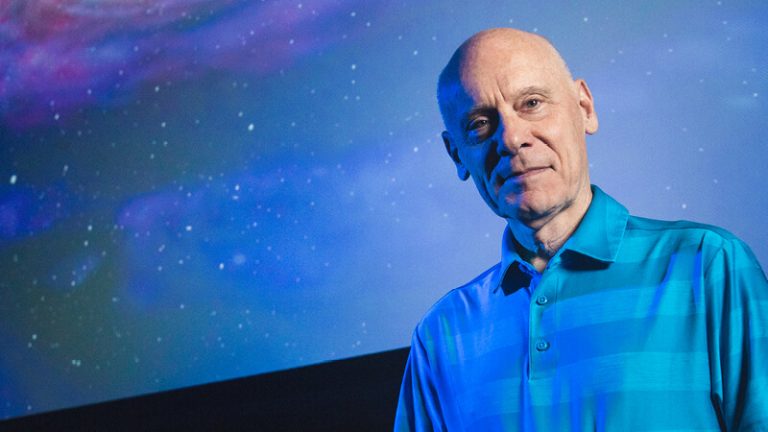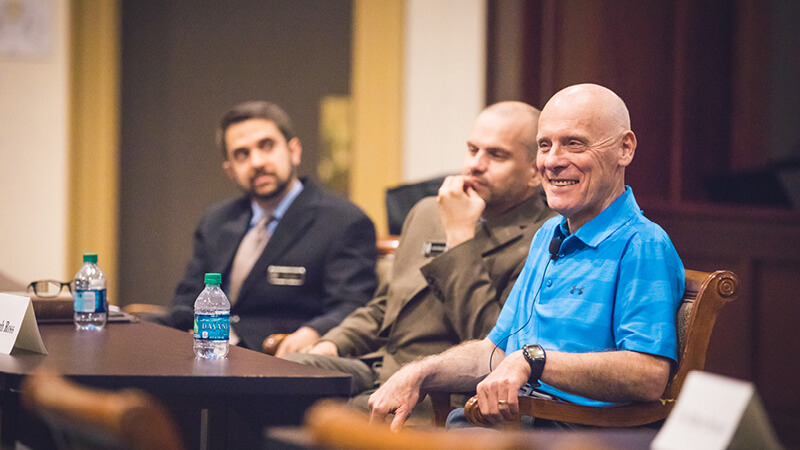Astronomer Hugh Ross Discusses Faith & Science
Dr. Hugh Ross
Founder, Reasons to Believe; Instructor, Regent’s M.A. in Apologetics & Cosmogony
Interview Conducted by Dr. Corné Bekker, Dean, School of Divinity – Winter 2020
Dr. Hugh Ross is no ordinary astronomer. He’s an internationally known astrophysicist and Christian apologist who has spent his life exploring science and religious texts to offer reasonable explanations for the origin of life. Known for his testable creation model, he’s proving faith and science are not incompatible, and the scenario that the Creator is the God of the Bible is more than a theory. Founder of Reasons to Believe, Ross is a best-selling author, traveling the world promoting the integration of science and biblical truth.
Ross talked to Dr. Corné Bekker, dean of Regent University’s School of Divinity and an expert in his own field, about his personal transformation, his mission to lead others to Christ by sharing the latest scientific discoveries that affirm the Christian faith, and his partnership with Regent’s M.A. in Apologetics & Cosmogony program.
CORNÉ BEKKER: You have a unique story about your own personal journey of faith. Can you share your testimony with us?
HUGH ROSS: I became a Christian in Canada. I was not raised in a Christian home. It was a moral home but not a Christian home. It was my studies in astronomy that persuaded me that there had to be a beginning to the universe. I went on a search to find that cosmic beginner, starting at age 16. I started with the writings of the great philosophers — that was disappointing. Then I began to look at the world’s holy books. And finally, I did pick up a Bible. It was a Gideon Bible that had been distributed by two Christian businessmen. They came to my school and left two boxes of Bibles on my teacher’s desk. These men were the first Christians I had ever seen. In fact, it wasn’t until I was at Caltech [California Institute of Technology] working on my postdoctoral research that I met Bible-believing Christians.
So, starting at age 17, I began to spend a minimum of an hour a day, starting at midnight, studying the Bible in complete secrecy, because I knew my family would be upset if they knew what I was doing. After studying it for a year and a half, I realized this book says everything I know about astronomy, that what the Bible talks about is true. I was particularly impressed that the Bible predicted future scientific discoveries and predicted future historical events. I couldn’t find a single error in the Bible — no provable errors. So, at age 19, I signed my name to the decision statement on the back of my Gideon Bible and committed my life to Jesus Christ. From that moment, I immediately began seeking opportunities to share my faith.
BEKKER: What compelled you to establish the organization Reasons to Believe? What’s the mission?
ROSS: Reasons to Believe was founded in 1986. The ministry was started after I gave three talks in my church on recent scientific findings that make for a much stronger case for the Christian faith. The leaders of the church approached me with the idea of launching an organization using the latest discoveries in the book of nature to bring people to the book of Scripture, which is based on the principle that God reveals Himself faithfully through both approaches. Our mission is to spread the Christian gospel by demonstrating that sound reason and scientific research — including the very latest discoveries — consistently support, rather than erode, confidence in the truth of the Bible and faith in the personal, transcendent God revealed in both Scripture and nature.
BEKKER: It doesn’t sound like you had opportunities for Christian fellowship early on in your journey. Tell me about your challenge to find a Christian community.
ROSS: Since I didn’t come to faith in Christ in a Christian community, I didn’t know how to find Bible-believing churches. My search to find a Bible-believing church and Christian fellowship was a long process. I’d visit churches, only to discover that those sitting in the pews and teaching from the pulpit, didn’t really believe the Bible. They didn’t believe the Bible is the final authority of the Word of God. So, I figured if the leaders don’t believe this truth, then their church wasn’t for me.
BEKKER: Would you say this struggle is still true today for new Christians? If so, how can ministry leaders overcome this problem?
ROSS: I think we need to appreciate that there are a lot of people in the same category as I was in and, therefore, we need to help them find these Bible-believing churches. That’s why institutions like Regent University need to ensure they’re producing divinity students who truly believe the Bible is without error and is the inspired, authoritative Word of God. It starts from the pulpit.
Fewer than 10% of Christians who regularly attend church share their faith. It’s important to recognize that there is no gift of evangelism in the Bible, because we’re all commanded to be evangelists. Just like there’s no gift of hospitality. We’re all commanded to be hospitable. So, we need to realize that sharing our faith applies to every Christian.
BEKKER: What tools can help more people share their faith?
ROSS: God’s general revelation through nature is a great tool to use, because it aids in leading others to Scripture where the truth can be discovered.
BEKKER: Can you share examples of how nature aids in leading others to faith in God?
ROSS: There are many of us who encountered things in nature that led to the belief that there is no naturalistic possibility to explain the origin of life, so it must be supernatural. A biochemist on my team became a Christian after studying the complexity of cells coupled with the inadequacy of evolutionary scenarios to account for life’s origin. In my case, it was realizing that the universe had a beginning, therefore, there must be a Beginner. The biggest thing missing in 21st century civilization is that we’ve lost contact with wild birds and wild mammals. These animals are designed by God to teach us lessons. And, He meant spiritual lessons. Let’s look at Job 12.
BEKKER: For those reading this interview, Job 12 says, “… But ask the animals, and they will teach you, or the birds in the sky, and they will tell you; or speak to the earth, and it will teach you, or let the fish in the sea inform you. Which of all these does not know that the hand of the Lord has done this? In His hand is the life of every creature and the breath of all mankind.”
ROSS: Part of the problem is many people are living in urbanized areas, in places where city lights mask the wonders of the Milky Way, and half the
world’s populations’ only contact with birds and mammals are with highly domesticated creatures. In places where these animals have never had contact with humans, never been abused by humans — they desire to come to us. They want to relate to us and serve and please us. They are motivated to serve and please a higher being. Likewise, God designed us humans to be motivated to serve and please a higher being. It’s our sin that causes these animals to run away from us instead of towards us. Just like our sin causes us to run away from God instead of toward Him. The really exciting thing for me is when you run into these wild creatures and you form a relationship with them and tame them, they outperform their wild cousins.
Likewise, when we allow ourselves to be tamed by our Creator, we outperform our wild cousins. Some animals are easier to tame than others; some require a higher being to do it. Similarly, it takes a higher being to tame a human being, as some of us are more difficult to tame.
BEKKER: Do you think our current culture is interested in conversations about where science and faith converge?
ROSS: Given the state of the 21st century church, we’re seeing people being discouraged by Christianity because they perceive the Christian community as not being willing to engage in the hard questions … not willing to engage science-faith issues, and therefore they run away.
On the other hand, I’ve found if you can demonstrate a willingness to deal with hardball questions about faith or integrate science and the biblical faith, they’ll flock. I got to see this at an origin-of-life research conference I attended, featuring a famous MIT researcher. The moment she realized I was a credible scientist, and I was prepared to deal with hardball questions, she kept the elevator door open for 20 minutes trying to keep the conversation going. She was hungry to hear my explanations.
BEKKER: Often the languages of science and academy are disconnected from everyday outreach and church ministry. How can we make this knowledge and training relevant and applicable to kind of boots-on-the-ground church leaders?
ROSS: Well, we’ve already figured this out for foreign missions with primitive tribes, which means you get to learn their language, you get to learn their culture, and you look for bridges. The academic and scientific community is a different culture. One of the things I’ve been trying to share with people is their basis of testing things. They want to see you producing a model that has greater explanatory power than their model. They’re not open to you chopping down their model, but if you can show them an alternative, if it offers a superior explanation with a greater explanatory power and predictive success, they’re all in. So, we need to take a positive approach and engage, rather than just simply say, “Your views are wrong.” We have to show them what is right.
BEKKER: This reminds me of something John speaks about in his gospel. Isn’t that partly what we are supposed to do — put some flesh onto these extraordinary concepts?
ROSS: Not only do we need to be preparing very good reasons for them to consider a different model. It’s how we present it. You know, the gentleness, the respect, the clear conscience. People will listen to your demeanor more than they will your word.
BEKKER: You’re right. The idea of a testable hypothesis and variable and falsifiable predictions are terms often associated with your work. Tell us more about that.
ROSS: The biggest complaint I hear from my academic, non-Christian peers: biblical faith/creation is not science because it’s not testable. It’s not falsifiable … doesn’t make predictions. Unfortunately, there are many creation models in the Christian community for which that is true. It’s why Reasons to Believe was launched 35 years ago with the goal to build a testable, predictable creation model. Our model not only offers greater predictive success and a more comprehensive explanation, but also, it was a way to engage the academic community.
BEKKER: We both know from our experiences, you don’t always have to defend the truth, just present it; it has persuasive and transformative power. I’ve heard you say many times to not be fooled, that sometimes individuals are most hostile just before they give their lives to Christ.
ROSS: Well, often when someone is close to receiving Christ, they’re thinking about all of the people in their peer group who are going to hit them with hostile questions.
And so often what I’ve seen them do is subconsciously reflect the questions they know they’re going to receive from their friends. Once their friends become aware that they are a Christian, they’re basically preparing for the role of evangelism. And so, when they’re hitting you with these really hostile questions, I think it’s important to realize they may be reflecting the emotions of their friends. Especially when I see the hostility growing and the questions multiply, I know they’re close.
BEKKER: One of the things I appreciate is the very gentle and humble approach you’ve adopted in apologetics and evangelism. Sometimes when you’ve presented, you’ll invite people to tell you what you’ve done wrong. Can you talk to me about this attitude of humility and vulnerability?
ROSS: I think it’s realizing God’s got options. He doesn’t have to use us to share the gospel with unbelievers. He’s got all these angels that are morally pure that can come and do it. For some reason, He’s told the angels to sit down, and He’s using us sinful human beings. I think it’s because He knows that if we sinners are sharing our faith, it’s going to help us achieve righteousness we otherwise wouldn’t get.
One of the ways I’ve found that works, especially if I sense I’ve been obnoxious or offensive in sharing my faith, is to ask for feedback. I want to know how I may have turned someone in the wrong direction, as to avoid doing it again in the future. I have found that non-Christians are quite eager to tell me where I need to shape up!
BEKKER: Dr. Ross, we are so excited that Reasons to Believe has partnered with Regent University’s School of Divinity to help us develop courses in apologetics and cosmogony. Every master’s and doctoral student will take a course in these areas. Can you share your thoughts on this?
ROSS: We are excited about this too. We were looking for a Christian educational institution to partner with, one that would teach how nature and the Bible integrate with each another. It’s important for students to know that before we publish our material, either in book or video form, the scientific content has been field tested first. We try it out on top academics and non-Christians to ensure it works, so it’s not just stuff we’re producing off the top of our heads. This produces confidence in the material, and because of that, we have found that students are eager to share their faith with non-Christian peers. Our goal is to equip students so they can engage people in a variety of settings about their faith and help lead people to Christ. The harvest for souls is there, so we are very committed to this partnership.
BEKKER: On behalf of Regent, thank you. It is our dream to graduate thousands of witnesses who are fully equipped and filled with the power of the gospel of Jesus Christ to change people’s lives and change our world.







